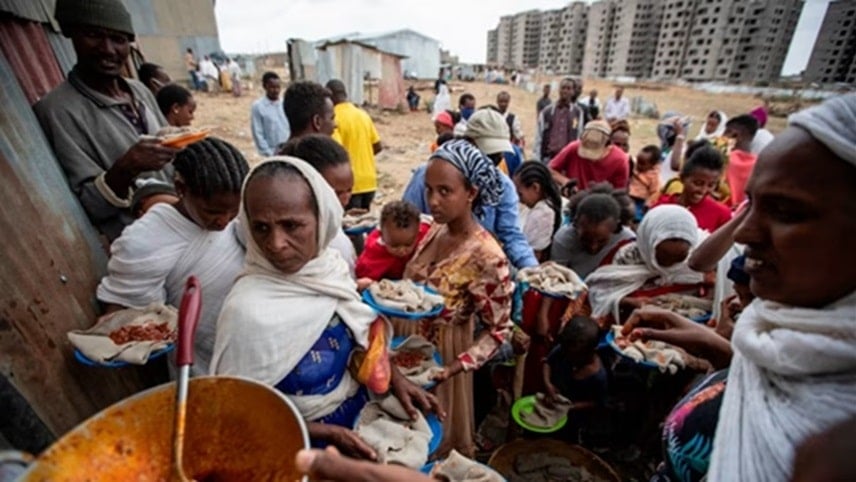
By: Abyot Alemu
In Ethiopia today, the markets are loud but the streets are quiet. Prices shout louder than people—bread, rent, fuel, and food costs have all soared beyond the reach of the average household. Civil servants’ salaries vanish within days, the unemployed drift between odd jobs, and parents skip meals so their children can eat. Yet in the face of this unrelenting hardship, the nation’s public squares remain calm. No swelling crowds, no mass demonstrations, no collective outcry. Just a heavy, unspoken silence. The contrast with neighboring Sudan is striking. There, in 2018, a modest increase in the price of bread sparked a chain of protests so forceful it brought down a dictator. In Ethiopia, the burden is heavier, but the streets stay still.
This quiet is not born of contentment. It is the product of history, fear, and fatigue. Ethiopians carry a long memory of what happens to those who challenge authority. From the post-election killings of 2005 to the violent suppression of the 2016 Oromo protests, the state has demonstrated again and again that dissent will be met with force. For many, protest is not an expression of freedom—it is an invitation to prison, injury, or death. Over the years, this has fostered a culture where political caution is a survival skill passed down like an heirloom.
The machinery of control reinforces this caution. Civil society is stifled by restrictive laws that all but ban organizations from engaging in governance or rights work. The independent press is harassed, censored, or dismantled. Journalists vanish from newsrooms into courtrooms or exile. Even the internet, that modern engine of dissent, is switched off during moments of tension, leaving communities isolated and disorganized. In such a climate, mobilizing for collective action is not simply difficult—it is perilous.
Ethiopia’s diversity, often a source of pride, also works against unified protest. With over ninety ethnic groups, political life is shaped by competing narratives and mistrust. What inflames outrage in one region may evoke little sympathy in another. Unlike Sudan’s bread protests, which coalesced around a simple, universal grievance, Ethiopia’s discontent is fragmented, making a united national movement harder to imagine.
Economic survival pushes protest further down the list of priorities. For millions, the question each morning is not how to hold leaders accountable, but how to secure food, water, and shelter. Daily income is often too fragile to risk in the uncertainty of demonstrations. Those who depend on government wages or aid know that dissent could cost them the little security they have. In this equation, silence becomes not just a habit, but a necessity.
There is also the matter of exhaustion. Years of war, displacement, and political instability have drained the country’s emotional reserves. In the north, the scars of civil war are still raw. In other regions, violence continues to displace and destabilize communities. Many people have lost faith that protest can bring real change, believing instead that it will only bring more loss.
Sudan’s experience shows how different ingredients can transform public frustration into mass action. There, professional associations provided leadership, women lent moral force to the movement, and history offered examples of successful uprisings. Ethiopia has no such recent precedent of peaceful protest achieving political transformation; here, the memories that remain are of funerals, not victories.
The silence, then, is layered. It is the silence of those calculating the cost of speaking. The silence of communities divided by mistrust. The silence of the hungry who cannot afford to miss a day’s income. The silence of the weary who have seen too much blood spilled already. It is not an absence of pain, but a quiet born of too much of it.
Yet silence is never permanent. Ethiopia’s people have endured hardships before, and history shows that the human spirit can awaken even in the darkest hours. The way forward begins with courage and unity. Citizens must find safe spaces to express their grievances, whether through civic associations, professional networks, or digital communities, and insist on the fundamental right to be heard. Communities divided by fear and mistrust must reach across ethnic and regional lines, discovering that shared struggle can forge shared strength.
Political reform is essential, but so too is moral courage from ordinary people. Independent media, civil society, and diaspora voices can act as beacons, shining light on injustices and giving ordinary Ethiopians the reassurance that their voices matter. At the same time, international allies can amplify these calls, lending weight to demands for transparency, accountability, and justice.
Economic relief, education, and access to opportunity are also crucial. When hunger and survival no longer dominate every decision, citizens can channel their energy into shaping a future that reflects their aspirations. Even small acts—raising awareness, documenting injustices, or participating in dialogue—become powerful steps toward change.
Ethiopia’s silence is heavy, but it is not eternal. Every generation carries the potential to transform quiet endurance into collective action. When the Ethiopian people reclaim their voice, they will do so not with noise alone, but with determination, vision, and the unshakable understanding that their silence has come at too high a cost. The challenge now is for courage to meet opportunity, and for hope to break the chains of fear that have held a nation in quiet for far too long.
